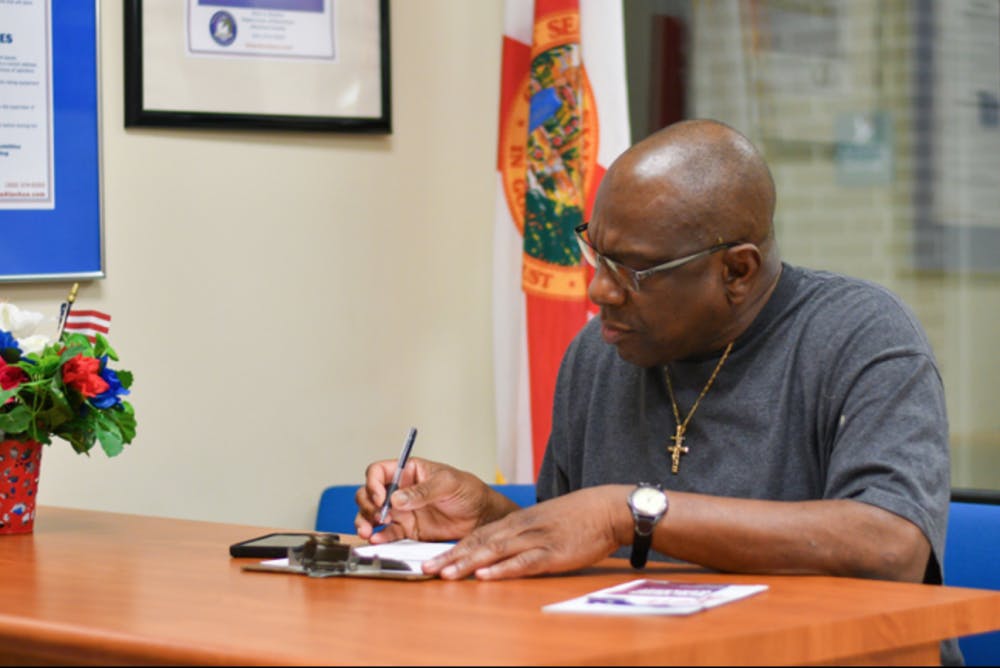Cherey Daniels, a 60-year-old ex-felon and Alachua County resident, is unsure if she can vote in upcoming elections.
Daniels had her civil rights restored in 2005. However, she still owes the state $15,000 in restitution, money she’s obligated to pay for serving time in a correctional facility.
Even 17 years after her release from prison, she said she can’t afford to pay that fee.
“I don’t want to check that box, because I can get in trouble,” Daniels said, referring to the part of the voter registration form that asks about felony status. If an ex-felon checks that box and owes fees, it is considered a violation of the law.
Daniels is not alone. Ex-felons from across Florida have continuously experienced challenges when registering to vote.
The Alachua County Commission discussed the restoration of voting rights Tuesday for people like Daniels at its special meeting. It unanimously passed a motion that will address concerns about restoration.
The motion focused on revising fees, listing ex-felons eligible to vote in Alachua County, partnering with public defenders, exploring other counties’ actions and community outreach.
In November 2018, Florida voters passed Amendment 4, which restored felons’ voting rights. It allowed 1.4 million ex-felons to become eligible to vote the following January and excluded those convicted for murder and sexual offenses.
On Tuesday, County Commissioners deliberated the complex restrictions in place for ex-felons. Bob Swain, senior assistant county attorney, explained that the constitutional amendment allows the restoration of voting rights for ex-felons not only after the completion of their sentence but also once they’ve paid all fines, fees and restitutions.
There is an ongoing legal battle between the state and national level about voting restoration, Swain said. Fifteen plaintiffs, two of whom are from Alachua County, filed a lawsuit against the state citing that the fee requirement for ex-felons is like a poll tax, according to the Tampa Bay Times. The Eleventh Circuit Court in Atlanta will provide an opinion, and Tallahassee is set to hear the trial in April.
“There is a chilling effect on people registering to vote if they had entanglement with the criminal justice system,” Swain said, adding that there is no way to know an ex-felon’s history in other states.
County Commissioner Mike Byerly expressed frustration with the handling of voting restoration for ex-felons. He said the right to vote should not be connected to whether or not someone has money.
His goal, he said, is for Alachua County to compile a list of ex-felons eligible for restoration and keep track of how much they owe. Commissioners discussed potentially helping ex-felons pay off fees.
But when this was addressed during the meeting, County Commissioner Charles Chestnut was skeptical of the solution. He said he fears creating a sense of false hope.
To Chestnut, the limitation on ex-felons with outstanding fees is equivalent to a poll tax, which were fees used to disenfranchise black voters during the Jim Crow era.
“They served their time,” Chestnut said. “They did their duty.”
Contact Grethel Aguila at gaguila@alligator.org. Follow her on Twitter @GrethelAguila.
Harry Jones, a 61-year-old formerly incarcerated Alachua County resident, registers to vote Tuesday, Jan. 8, 2019, at the Alachua County Supervisor of Elections office. Jones, who has been out of prison for 13 years, had his right to vote restored after Amendment 4 passed in the 2018 midterm election. Tuesday was the first day Amendment 4 was put into effect. About 50 people registered to vote in Alachua County, said TJ Pyche, the elections office spokesperson.






